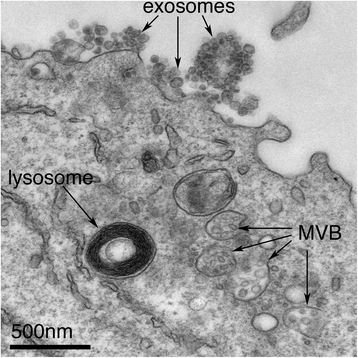- Joined
- Feb 23, 2017
- Messages
- 5,768
This is not a topic that I'd ordinarily bring up on this forum, because of all the scientific holes in this theory (which some people are calling a conspiracy theory), but it is one more piece of information that everyone should be armed with during these viral days of Covid.
It relates to the similarity of a non-infectious cellular metabolic product called an exosome and highly contagious corona virus (or flus, or measles, etc.).
It's being said that the current lockdown is unnecessary because exosomes aren't contagious and Covid is an exosome (hmmm?).
Here's what a reliable journal has to say about what an exosome really is:

This is from:

 bmcbiol.biomedcentral.com
bmcbiol.biomedcentral.com
The new theory nowadays is being espoused in well-written articles like this:

And videos like this:
Though I do agree that the current sensationalist media coverage and extended worldwide lockdown is over the top, IMHO this exosome argument is not good science.
Maybe someone can explain to me the clear observations about the transmissibility of Covid. I can't understand, objectively, how it is that an exosome is causing so much illness when they are the result of cellular stress and not the cause of dis-ease.
It relates to the similarity of a non-infectious cellular metabolic product called an exosome and highly contagious corona virus (or flus, or measles, etc.).
It's being said that the current lockdown is unnecessary because exosomes aren't contagious and Covid is an exosome (hmmm?).
Here's what a reliable journal has to say about what an exosome really is:
Exosomes are extracellular vesicles first described as such 30 years ago and since implicated in cell–cell communication and the transmission of disease states, and explored as a means of drug discovery. Yet fundamental questions about their biology remain unanswered. Here I explore what exosomes are, highlight the difficulties in studying them and explain the current definition and some of the outstanding issues in exosome biology.
What is the current definition of an exosome?
That is a very good question. Since the original description of exosomes over 30 years ago, the term has been loosely used for various forms of extracellular vesicle, muddying the field and contributing to the scepticism with which the research has sometimes been met. Exosomes are best defined as extracellular vesicles that are released from cells upon fusion of an intermediate endocytic compartment, the multivesicular body (MVB), with the plasma membrane. This liberates intraluminal vesicles (ILVs) into the extracellular milieu and the vesicles thereby released are what we know as exosomes (Fig. 1).
This is from:

Q&A: What are exosomes, exactly? - BMC Biology
Exosomes are extracellular vesicles first described as such 30 years ago and since implicated in cell–cell communication and the transmission of disease states, and explored as a means of drug discovery. Yet fundamental questions about their biology remain unanswered. Here I explore what...
The new theory nowadays is being espoused in well-written articles like this:

Is Coronavirus Contagious? - Nourishing Traditions
The premise that coronavirus is highly contagious and can cause disease provides the justification for putting entire nations on lockdown, destroying the global economy and throwing hundreds of thousands out of work. But is it contagious? Does it even cause disease?
nourishingtraditions.com
And videos like this:
Though I do agree that the current sensationalist media coverage and extended worldwide lockdown is over the top, IMHO this exosome argument is not good science.
Maybe someone can explain to me the clear observations about the transmissibility of Covid. I can't understand, objectively, how it is that an exosome is causing so much illness when they are the result of cellular stress and not the cause of dis-ease.
